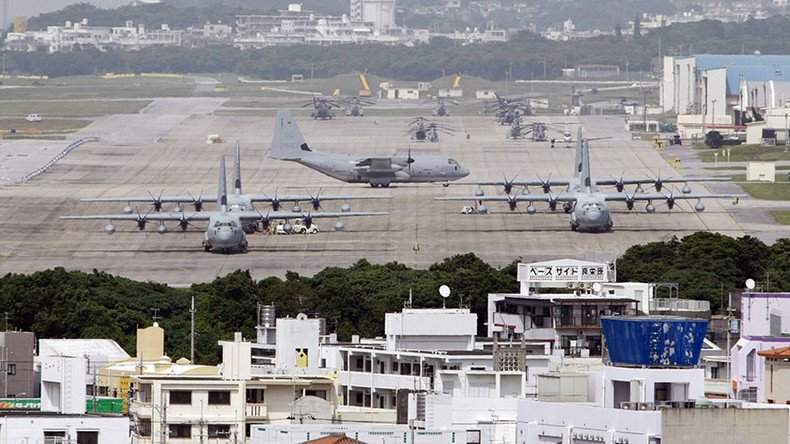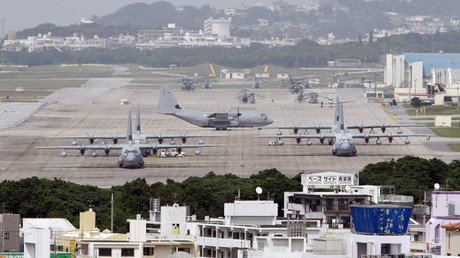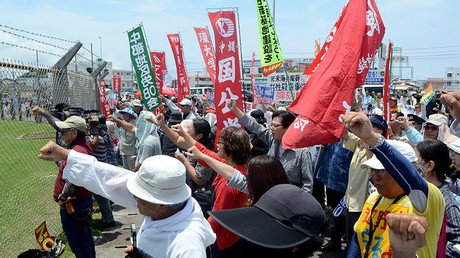Tokyo to review ‘one-sided’ privileged status of Americans working at US bases in Japan

Tokyo and Washington have reportedly agreed to limit the preferential treatment given to US citizens under a 1960 agreement on the US armed forces in Japan. Okinawa, home to several US military bases, has long complained that it is overly protective.
The two sides have agreed that American civilians paid by the US government to work for the US military in Japan should be subject to the Japan-US Status of Forces Agreement (SOFA), a Japanese government source told Kyodo news agency.
“Japan and the United States are currently reviewing the treatment of Americans subject to the (SOFA). We are making final arrangements to swiftly compile effective measures,” Japan’s deputy chief cabinet secretary, Koichi Hagiuda, told a news conference.
As things stand now, Japanese prosecutors do not have the power to indict members of the US military or its “civilian component” if they are alleged to have committed a crime while they were on duty, giving US authorities carte-blanche to take jurisdiction over the case. Okinawa says the applicable scope of the “civilian component,” as currently defined in the agreement, is ambiguous. The pact defines it as “civilian persons of United States nationality who are in the employ of, serving with, or accompanying the United States armed forces in Japan.”
Okinawa hosts several huge US military bases that occupy nearly one fifth of the island’s territory and accommodate about 50,000 US nationals, including 30,000 military personnel. The bases, which many locals see as a disturbing legacy of America’s post-WWII military occupation of Japan, have been blamed for noise, air pollution, and crime.
Citing local police statistics, the Japan Times reported that from the reversion of Okinawa to Japan in 1972 to the end of last year, the prefecture had seen at least “574 heinous crimes committed by members and civilian workers of the US forces and their relatives,” including 26 murders, 129 rapes, 394 burglaries, and 25 cases of arson.
Earlier this year, a US civilian base worker was arrested on suspicion of raping and murdering an Okinawa woman. Thousands protested the killing of Rina Shimabukuro, a 20-year-old office worker from the city of Uruma who disappeared in late April. Her body was found after a confession from Kenneth Franklin Gadson, a 32-year-old former US Marine who had been working as a contractor at the Kadena Air Base. The veteran admitted to strangling the girl, but his defense attorney told Stars and Stripe that Gadson had confessed to police while he was “still in a daze” from two suicide attempts.
In late May, another US Marine, who was charged with the rape of a Japanese woman on the island of Okinawa, pleaded guilty to the crime, which occurred in mid-March. The serviceman, Seaman Apprentice Justin Castellanos, 24, admitted to finding the drunk and passed-out Fukuoka tourist in the hallway of Naha hotel, where he was staying. Appearing before a three-judge panel at a Naha District Court, the American pleaded guilty to the rape and said he had decided to take advantage of the situation by taking the fast-asleep woman to his room.
On July 4, another US Air Force member stationed in Okinawa’s Kadena Air Base was arrested on suspicion of drunk driving, The Asahi Shimbun reported. According to local prefectural police, Staff Sargeant Christopher Aaron Platte, 27, has denied the charges.
Late last month, Okinawa police arrested a woman who worked at a shop on a US military base for drunk driving. The arrest came after the Japanese prefecture had launched night patrols following the suspected rape and murder of a local woman by a US contractor.
Francis Shayquain Elijah, 24, drove her car into another vehicle at an intersection close to her home, Kyodo news agency reported, adding that the Japanese driver was taken to the hospital. The suspect first denied being drunk, alleging that she had only consumed spirits the previous day, but a breath test revealed that she had an alcohol level four times the legal limit, according to Japan Today.
That incident followed the recent case of a US Navy sailor who was also arrested on suspicion of driving drunk which involved a collision with two mini vehicles that left two locals injured.
In an effort to bring more discipline to the troops, the US Navy command imposed a drinking ban on all 18,600 sailors stationed in Okinawa in early June. Ten day later, however, a statement from US Naval Forces Japan said that sailors were allowed to drink on base as well as at their off-base houses. Other drinking off-base is still prohibited, AP reported.














